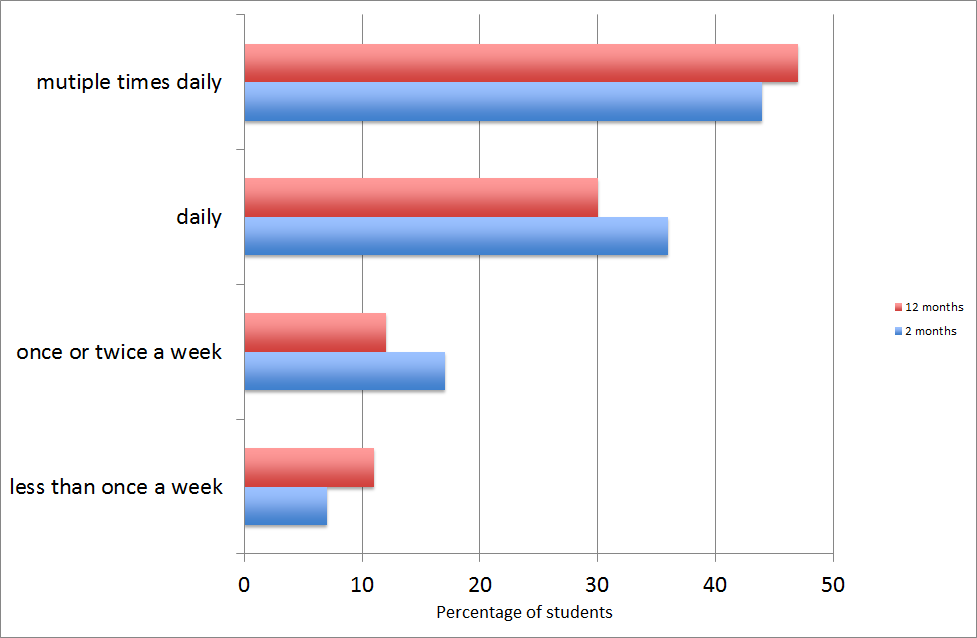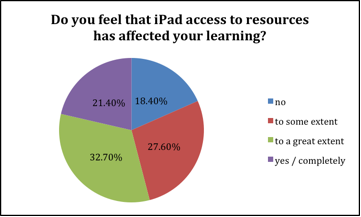


Theme
8II Mobile learning
INSTITUTION
Manchester Medical School, University of Manchester
Mobile technologies are becoming more commonplace in society and education.
Growth of 'just in time' technologies mean that facts and complex processing capacity are constantly available for students and health professionals.
Students who opt in to having a smartphone access information to assist with diagnosis/treatment (Hardyman, Bullock, Brown, Carter-Ingram, Stacey, 2013). They use technology devices when they see a clear need (Ellaway, Fink, Graves, Campbell, 2014) and when information is preloaded (Davies et al 2012).
Manchester was the first medical school in the UK to distribute iPads to all clinical medical students. We were interested in our students' perceptions of their iPads, and how they used them.
4th year medical students were provided with iPads (n=443) in December 2011.
They were asked to complete surveys when they got their iPads, and 2 months, 6 months and 12 months post distribution.
Questionnaires investigated:
a. What students were using their iPads for.
b. How often they used the iPads.
c. Their perceptions of how the iPads impacted on their learning.
How I use my iPad - Kate Bowman from Manchester Medical School on Vimeo.
Davies, B. S., Rafique, J., Vincent, T. R., Fairclough, J., Packer, M. H., Vincent, R., & Haq, I. (2012). Mobile Medical Education (MoMEd) - how mobile information resources contribute to learning for undergraduate clinical students - a mixed methods study. BMC Medical Education, 12(1), 1. doi:10.1186/1472-6920-12-1
Ellaway, R. H., Fink, P., Graves, L., & Campbell, A. (2014). Left to their own devices: medical learners’ use of mobile technologies. Medical Teacher, 36(2), 130–8. doi:10.3109/0142159X.2013.849800
Hardyman, W., Bullock, A., Brown, A., Carter-Ingram, S., & Stacey, M. (2013). Mobile technology supporting trainee doctors’ workplace learning and patient care: an evaluation. BMC Medical Education, 13(1), 6. doi:10.1186/1472-6920-13-6
Response rates: Baseline - 95%, 2months - 58%, 6 months - 32%, 12 months - 43%.
Uses of iPads by students (at 12 months)
Recording workplace learning activities - 70% (132/188)
Develop new learning tools, skills and approaches - 77% (144/187)
Use in previously wasted time - 77% (144/187)
Mediated communications and sharing resources within PBL group (78% (145/185)) and beyond group (66% (124/188))
Frequency of usage for learning

Figure 1: Frequency of usage of iPads for learning at 2 and 12 months following distribution
Impact on learning

Figure 2. Students’ perceptions about iPads changing learning (at 2-months)
iPads are used frequently by students.
Most students felt that iPads had impacted positively on their learning.
Students were not a homogenous group in terms of their iPad usage - this has important implications for the widespread education implementation of just in time technologies.
The study raises more research questions - for example; are students using iPads as a 'fact repository'; how medical education might evolve to reflect widespread use of technology; how technology can be appropriately used in clinical environments?
 Send Email
Send Email